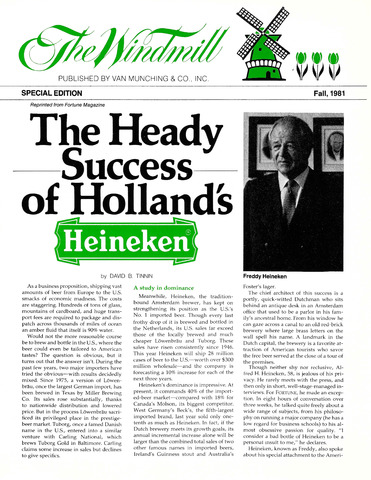PUBLISHED BY VAN MUNCHING CO., INC.
SPECIAL EDITION
Fall, 1981
5 5
Reprinted from Fortune Magazine
The Heady
Success
of Holland^
Heineken
by DAVID B. TINNIN
As a business proposition, shipping vast
amounts of beer from Europe to the U.S.
smacks of economic madness. The costs
are staggering. Hundreds of tons of glass,
mountains of cardboard, and huge trans
port fees are required to package and dis
patch across thousands of miles of ocean
an amber fluid that itself is 90% water.
Would not the more reasonable course
be to brew and bottle in the U.S., where the
beer could even be tailored to American
tastes? The question is obvious, but it
turns out that the answer isn't. During the
past few years, two major importers have
tried the obviouswith results decidedly
mixed. Since 1975, a version of Löwen
brau, once the largest German import, has
been brewed in Texas by Miller Brewing
Co. Its sales rose substantially, thanks
to nationwide distribution and lowered
price. But in the process Löwenbrau sacri
ficed its privileged place in the prestige-
beer market. Tuborg, once a famed Danish
name in the U.S., entered into a similar
venture with Carling National, which
brews Tuborg Gold in Baltimore. Carling
claims some increase in sales but declines
to give specifics.
A study in dominance
Meanwhile, Heineken, the tradition-
bound Amsterdam brewer, has kept on
strengthening its position as the U.S.'s
No. 1 imported beer. Though every last
frothy drop of it is brewed and bottled in
the Netherlands, its U.S. sales far exceed
those of the locally brewed and much
cheaper Löwenbrau and Tuborg. These
sales have risen consistently since 1946.
This year Heineken will ship 28 million
cases of beer to the U.S.worth over $300
million wholesaleand the company is
forecasting a 10% increase for each of the
next three years.
Heineken's dominance is impressive. At
present, it commands 40% of the import-
ed-beer marketcompared with 18% for
Canada's Molson, its biggest competitor.
West Germany's Beck's, the fifth-largest
imported brand, last year sold only one-
tenth as much as Heineken. In fact, if the
Dutch brewery meets its growth goals, its
annual incremental increase alone will be
larger than the combined total sales of two
other famous names in imported beers,
Ireland's Guinness stout and Australia's
Freddy Heineken
Foster's lager.
The chief architect of this success is a
portly, quick-witted Dutchman who sits
behind an antique desk in an Amsterdam
office that used to be a parlor in his fam
ily's ancestral home. From his window he
can gaze across a canal to an old red-brick
brewery where large brass letters on the
wall spell his name. A landmark in the
Dutch capital, the brewery is a favorite at
traction of American tourists who savor
the free beer served at the close of a tour of
the premises.
Though neither shy nor reclusive, Al
fred H. Heineken, 58, is jealous of his pri
vacy. He rarely meets with the press, and
then only in short, well-stage-managed in
terviews. For FORTUNE, he made an excep
tion. In eight hours of conversation over
three weeks, he talked quite freely about a
wide range of subjects, from his philoso
phy on running a major company (he has a
low regard for business schools) to his al
most obsessive passion for quality. "I
consider a bad bottle of Heineken to be a
personal insult to me," he declares.
Heineken, known as Freddy, also spoke
about his special attachment to the Ameri-

